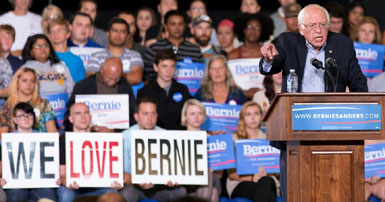by Rona Fried
Now that Bernie Sanders (and Donald Trump) have proven they can win by large margins, let’s take a look at what the outcome might be for Bernie’s "Santa Claus" New Deal agenda.
An analysis of Bernie’s economic platform shows that if he can get it enacted, it would create a broadly shared, much more prosperous economy, according Economics Professor Gerald Friedman, at University of Massachusetts/ Amherst.
Like FDR’s New Deal, it would do much more than increase economic activity. By 2026, median household income in the US would rise an impressive $22,000, bringing it to $82,200 – way above the Congressional Budget Office (CBO) estimate of $59,300 under business-as-usual projections.
And while the CBO forecasts poverty levels of 13.9% by then, under Bernie’s plan, "poverty would plummet to a record low 6%," concludes Friedman.
About 26 million jobs would be created and unemployment would fall to 3.8%.
Economic growth would also be much higher at 5.3% per year, instead of 2.1%, and even with all the spending Bernie proposes, the current $1.3 trillion deficit would be transformed into a large surplus by the end of Sanders’ first term.

How would this come to pass? By stimulating a huge upswing in the economy that lifts everyone up. Citizens across the economic and age spectrum would be much more secure and have more money to spend:
- poor people benefit from a raising the minimum wage to $15
- investments in infrastructure to the levels that are needed, create 13 million well-paying jobs for the middle class
- higher Social Security payments give older people security and money to spend
- making public colleges tuition-free, allowing people to refinance student debt
- making health care affordable for everyone: by eliminating expensive premiums, even saving the federal government $3.1 trillion from unnecessary tax deductions of those premiums.
- bringing more revenue into government programs by fairly taxing the rich and corporations
These policies stimulate the economy much more than tax cuts – Republicans’ main policy tool – Friedman says.
Tax cuts mostly go to the rich and allow big corporations to pay nothing at all. This saps the economy and attacks any "collective actions" for getting in the way, from labor rights to environmental protection. So far, these policies have brought us the income inequality we see today, closer and closer to to the Robber Baron days, when workers struggled in sweat shops.
Sanders would also do more to protect our environment and address climate change than any president in history.
Read our article, If You Care About Environment & Climate, You’ll Love Bernie.

